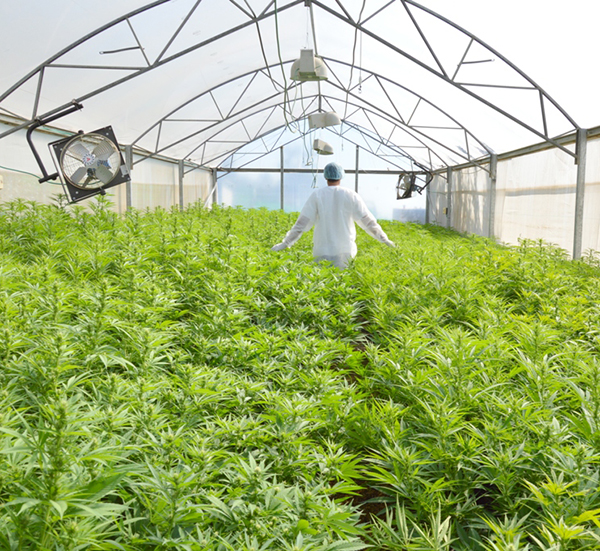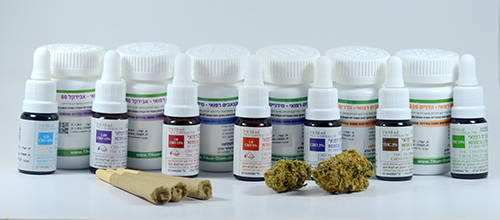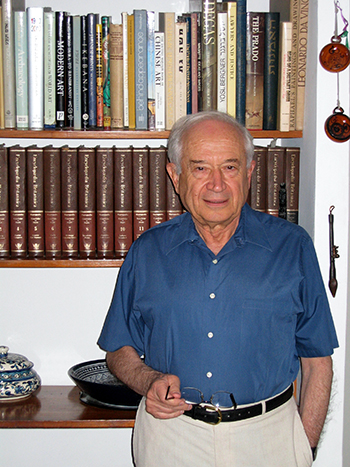Israeli Scene
Life + Style
The Promised Land of Medical Marijuana

The farm, inland from Caesarea and deep into agricultural Israel, looks similar to others along these little-used roads. But take a second glance. Rather than naming the site, signs warn that dogs patrol the area. High walls enclose the farm and only the curved roofs of its greenhouses are visible from outside. A ditch, muddy from recent rains, encircles the site’s sole entrance, which is topped by security cameras.
Step inside—if you have a police permit—enter one of the greenhouses, and all becomes clear. The aroma wafting off the rows of leafy plants hits like a tsunami.
This is Breath of Life Pharma, known as BOL Pharma, one of Israel’s eight farms authorized to cultivate cannabis.
While marijuana remains “an illegal and dangerous drug” under Israeli law, some 25,000 Israelis lawfully ingest it each day—via joints, capsules, spiked cake, cookies, candy, gum, honey, ointments or oil drops, purchased at distribution centers or through the mail. They do so under license from Israel’s Health Ministry, which recognizes that the herb often helps where all else fails—relieving pain, controlling seizures, lowering blood pressure, easing inflammation, reducing anxiety, regulating appetite and inducing sleep.
This recognition, along with the cannabis farms and pending legislation to ease access to the drug, makes the country’s medical marijuana program one of the most advanced in the world. Israel is poised to become a medical marijuana powerhouse, exporting its know-how and technology around the globe. “Since 2014, U.S. firms have invested about $50 million in licensing Israeli medical marijuana patents, cannabis agro-tech startups and firms developing delivery devices, like inhalers,” says Saul Kaye, CEO of the private startup iCAN-Israel Cannabis. (Cannabis is the term for the whole plant; marijuana is its dried leaves and female flowers; and hashish is the dried sap of the cannabis flower.)
Israel has some of the world’s largest cannabis farms, known as cultivation facilities, according to Dr. Tamir Gedo, BOL Pharma’s CEO. “For cannabis,” he says, “we’re in the Promised Land of 300 days’ sunshine each year and perfect levels of humidity.”
Operating under the Health Ministry’s Dangerous Drugs Ordinance, all eight cultivation facilities produce medical-grade cannabis, monitoring and controlling their seeding while harvesting and processing their product under tight security. Some of the farms also house research labs where they tweak the plant’s biochemistry, trying to produce the new industry’s Holy Grail: a purified marijuana that can be administered in accurate doses with minimal side effects, which can include mood swings, nausea and appetite and sleep disturbances.
BOL Pharma leads the field in the search for purified marijuana and is the only Israeli cannabis farm accredited for Good Manufacturing Practice, Good Agricultural Practice and Good Distribution Practice—globally recognized production and quality guidelines for pharmaceutical and agricultural products. Each of the 230 different strains of the herb grown on the farm is monitored by software that controls its biochemical parameters.
Another cultivation facility, Tikun Olam, is the largest of Israel’s marijuana farms. Like the others, it is vague about its location, listing itself online as “near Safed.” Its thousands of plants grow in neat green rows in climate-controlled greenhouses and comprise several hundred proprietary hybrids. The Erez and Eran Almog strains, for example, are recommended for severe pain. Another, Avidekel, is rich in cannabidiol (CBD) anti-inflammatory properties and has minimal
psychoactivity. Several of these hybrids are now grown in the United States, following a partnership between Tikun Olam and a private investment group composed of Compassionate Care Center of New York, a biopharmaceutical company, and MedReleaf Corp., a producer and distributor of medical-grade cannabis in Canada.
“We’re examining the effects of our products on a wide variety of diseases, trying to match them,” says Dr. Zvi Bentwich, head of the Tikun Olam research team and a leading AIDS researcher who was one of the first physicians in Israel to treat AIDS with medical cannabis. “We’re currently involved in clinical trials of epilepsy, Crohn’s disease and tinnitus.”

Between 2009 and 2013, Tikun Olam conducted an observational study of residents at the Hadarim Retirement Home on Kibbutz Na’an in central Israel who took medical marijuana via vaporizer, powder or oil. Over the course of the study, the 19 elderly participants experienced weight gain, increased calorie intake, longer and better sleep, stabilized hemoglobin levels and decreased use of painkillers, sedatives and antidepressants. “We’ve already learned to prolong life,” says Hadarim’s head nurse, Inbal Sikorin. “Marijuana adds to the quality of life.”
In similar spirit, Tikun Olam runs one of the world’s first medical marijuana clinics, located in Tel Aviv, to guide patients through treatment. An array of cannabis-based products—available to those with a prescription—lines the shelves of its adjacent store. Already sold in Canada since 2013 under the MedReleaf label, they may shortly be available in parts of the United States, too.
Both BOL Pharma and Tikun Olam personnel and products were much in evidence at the first annual CannaTech International Summit for Accelerating Cannabis Innovation, which met in Tel Aviv last March. Organized by iCAN-Israel Cannabis, which is commercializing cannabis-related technologies for the world market, the CannaTech summit was one of the largest-ever gatherings of medical marijuana experts, bringing together some 400 scientists, researchers, investors and industry players from 15 countries. Currently prohibited by national law from exporting its plants directly, Israel is bringing its agronomic, medical and technological expertise to what promises to be “an opportunity we mustn’t miss,” according to Kaye, iCAN’s CEO. “The legal marijuana market in the United States is currently valued at $5.7 billion and expected to grow to $25 billion by 2020,” he says. “There’s a great deal of research ahead, but it moves faster in Israel, where clinical trials on marijuana are permitted.”
Two of the key players in the medical marijuana industry are a 67-year-old Hasidic rabbi and an 86-year-old Holocaust survivor. The rabbi is Israeli Health Minister Yaakov Litzman of the ultra-Orthodox United Torah Judaism Party, who, with his long white beard and wide black hat, is crusading to “actively promote medical use of marijuana because, properly used, it’s a powerful pharmaceutical with wide application,” he says. On June 26, 2016, his efforts were rewarded with an Israeli Knesset vote in favor of distributing the drug in all forms to authorized patients through local pharmacies, increasing the number of doctors permitted to prescribe it and ensuring its uniform quality.
While Litzman wrestles with legislation to regulate marijuana’s medical use, Bulgarian-born organic chemist Raphael Mechoulam continues his pioneering research of over half a century. His work has paved the path to medicinal use of cannabis worldwide, and he was among the first to urge legalization of its derivative compounds for medical use in Israel. A professor of medicinal chemistry at the Hebrew University of Jerusalem for the past 44 years, Mechoulam has published nearly 200 articles in top medical journals around the world.

“I was newly back in Israel after a postdoc at the Rockefeller Institute in New York,” he says of when he entered the field in 1960. “As junior faculty in the Weizmann Institute’s chemistry department, I needed a research topic of importance. Cannabis seemed to fit the bill.”
Cannabis is one of the three major plant-derived drugs considered illicit by most countries and, in 1960, it was the only one whose active ingredients had neither been isolated nor its chemical structure unraveled. The opium poppy had yielded morphine in the early 19th century, and cocaine had been extracted from coca not long afterward. A century later and with advances in technology, the then-30-year-old Mechoulam believed he could untangle cannabis’s closely related constituents.
Given its illegal status in Israel, the police seemed his best bet for a research stash. “I went to Weizmann’s administrative director and asked if he had police contacts,” recalls Mechoulam. “He called a senior police officer with whom he’d served in the army. Once he was assured I was reliable, the officer summoned me to Tel Aviv to collect 11 pounds of superb smuggled Lebanese hashish. I brought it back to Rehovot on the bus, mystifying fellow passengers with the smell from my backpack! We later learned that without a Health Ministry permit, our transaction was illegal, but, since I was ‘reliable,’ I simply had to apologize.”
With Health Ministry approval, the Israeli police continued supplying Mechoulam with cannabis for research. “No one was much interested in cannabis then,” he says, smiling. “We kept it in an unlocked lab cupboard.”
His early studies caused few ripples. He re-isolated CBD, a major nonpsychoactive compound in cannabis, and elucidated its structure. In the years since, CBD has been recognized as a treasure trove of medical applications: It is a potent anti-epileptic and anti-inflammatory agent; it eases rheumatoid arthritis symptoms; and, as groups at the Hebrew University–Hadassah Medical Center in Jerusalem have discovered, it reduces sugar levels in type 1 diabetes and ameliorates heart ischemia (a blockage in a cardiac vessel that reduces blood flow to the heart). Recent indications show that it helps heal bone fractures and may have application in Alzheimer’s and other dementias. Dr. Reuven Or, Hadassah Hospital’s head of bone marrow transplantation, is working with Israeli cannabis producer Cannabliss to use medical marijuana to ease the side effects of bone marrow transplants. Cannabliss also supplies marijuana oil and other nonsmoking products to Hadassah’s medical marijuana dispensary.
It was Mechoulam’s success in isolating and synthesizing cannabis’s main psychoactive component that put his research on the map. In 1964, with colleagues Yehiel Gaoni and Haviv Edery, he identified tetrahydrocanna-binol (THC)—which, to their surprise, turned out to be the sole hallucinogenic compound in what Mechoulam terms “the horrendous cannabinoid soup” that comprises cannabis.
Shortly after this, he received a call from a pharmacologist at the National Institutes of Health in Bethesda, Md., who remembered “a young person in the Middle East working on cannabis,” recounts Mechoulam. “I’d applied for NIH research funding a year or so earlier, but they’d turned me down, saying cannabis wasn’t used in the United States and wasn’t an American problem. Now, the son of a United States senator had been caught smoking pot, and the senator feared brain damage. After reassuring them that the son was fine, I gave them 10 grams of THC we’d extracted—at the time, it was the entire world’s supply—to begin their own research. They’ve funded our work ever since.”
By the end of the 1960s, the flower generation had blossomed, marijuana and even THC had entered the daily lexicon—and the United States Drug Enforcement Agency had classified cannabis as a schedule-1 drug “with a high potential for abuse and potentially severe psychological and/or physical dependence.” And there, at the federal level, it remains, rubbing shoulders with heroin and LSD, with security regulations shackling most research on the plant.
Israeli research, in contrast, was—and is—flying high. Its next major advance followed from a puzzling 1988 discovery made in the United States by researchers Allyn Howlett and Bill Devane of the Saint Louis University School of Medicine: They found THC receptors in the human brain. THC does not occur naturally in the body, so they asked, why are there brain proteins to transmit its neural signals?
Mechoulam and his team solved the mystery when they discovered a molecule that they saw as essentially the body’s own form of marijuana. They named it anandamide (ananda means “supreme joy” in Sanskrit, a language that Devane, who had joined Mechoulam’s team, was studying at the time) and found that it is active in memory, higher thought processes and movement control.
It also plays an important role in pain, appetite and fertility, and
helps deter the proliferation of
cancer cells. With this discovery, cannabis research had provided insight into molecular processes affecting human behavior and was leading to an entirely new family of therapeutic drugs.
In 1999, its use was officially approved in Israel for patients undergoing chemotherapy as well as for those with final-stage tumors, HIV/AIDS, chronic pain, Crohn’s disease, ulcerative colitis, multiple sclerosis and post-traumatic stress disorder. Marijuana medication costs $100 monthly and is prescribed by physicians—oncologists, psychiatrists, family doctors, pediatricians and more—trained in its use. Because of conservatism or lack of knowledge, only 36 Israeli physicians have so far taken the two-day training that allows them to prescribe the drug, a number that Health Minister Litzman plans to increase.
The grandfather of medical cannabis, however, is hopeful for the future. “Medical marijuana, in Israel as elsewhere, is a work in progress,” Mechoulam stresses. “It needs much more research and long-term follow-up studies. But we’re moving in the right direction.”
Wendy Elliman is a British-born science writer who has lived in Israel for more than four decades.
See our article on the growing number of American 55 and older using medical marijuana to ease their aches and pains.







 Facebook
Facebook Instagram
Instagram Twitter
Twitter
Garlic Chef Ken says
All is bliss, all is bliss, I am standing at the feet of my lord, all is bliss
SHAKTI
ToScared says
The county should do a full BOYCOTT on Alcohol and or Tobacco and maybe even Vapor and see how quick things turn around for marijuana reform. If they start loosing money they may panic and push faster for the legalization of a plant in which makes people healthier and make better choices and create awesome innovations for society and the earth.
ToScared says
The country should do a full BOYCOTT on Alcohol and or Tobacco and maybe even Vapor and see how quick things turn around for marijuana reform. If they start loosing money they may panic and push faster for the legalization of a plant in which makes people healthier and make better choices and create awesome innovations for society and the earth.
Morgan468 says
Have you all at any point had a go at trying cannabis for medicinal purposes? CBD is a currently a hot topic now. Some countries are trying to reinforce the benefits of cbd and that an adult 18 years of age or older, can legally possess 150 grams of fresh cannabis. Cbd is not really a bad thing. I found an article like blimburnseeds.com/store-locator/united-kingdom/ and how it can help you in terms of pain management, anxiety disorders and panic attacks, inflammation, even cancer and a lot more. Cbd and thc are also new to me and I don’t even smoke. Alternatively, they’ve also found new ways to infuse cannabis on food and beverages. If this is true I can’t find any solid conclusive evidence that speaks to its efficacy. Any personal experience or testimonial would be highly appreciated. Thanks
Joseph says
This is very informative! Thank you for sharing!